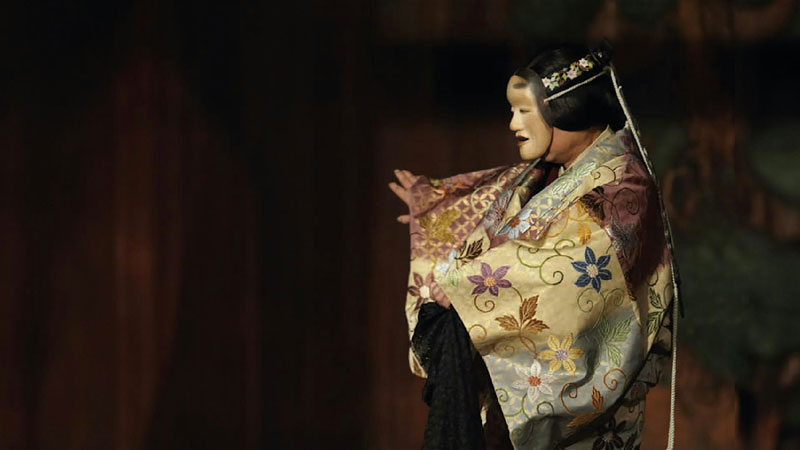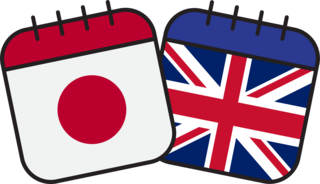
Image: Matsui Akira in a 2011 performance of Rockaby in Japanese at the Oe Noh Theatre in Kyoto. Directed by Jonah Salz for Noho Theatre Group. Photography: Muranaka Osamu.
An Evening of Noh Performance: Rockaby by Samuel Beckett and Adaptation of Kazuraki by Zeami
- 11 September 2024
- 18:30 - 19:30
- The Hall, Japan House London, 101-111 Kensington High Street, London, W8 5SA
- https://www.japanhouselondon.uk/whats-on/an-evening-of-noh-performance-rockaby-and-kazuraki/
- +44 (0)20 7932 7100
- info@japanhouselondon.uk
- Tweet
Experience two innovative performances that demonstrate the contemporary relevance of Japanese Noh drama, one of the world’s oldest continuing performance forms.
The first performance is Rockaby, a fifteen-minute solo play written by Samuel Beckett in 1980. The play centres on a woman, seated in a rocking chair, who is rocked gently into that dark eternal night by her own voice. In this rarely seen version, directed and performed by the master Noh actor of the Kita School, Matsui Akira, and authorized by Samuel Beckett himself, the ethereal beauty of Noh offers a stylized and profoundly moving interpretation of Beckett’s play – a ‘monodrama fusing poetry, ritual, and drama’.
The second performance is a brand-new adaptation of the classical Noh piece Kazuraki. The story focuses on a mountain deity Kazuraki who attains salvation after a group of sheltering mountain priests pray for her. Featuring the mask maker Kitazawa Hideta, the Noh master Matsui Akira, composer and musician Richard Emmert, as well as instrumentalists Laura Sampson (flute) and Ashley Thorpe (taiko drum) – this innovative performance is a meditation on the Noh mask, spirits and the significance of ritual.
This event is part of From Tradition to Modernity, a series of linked activities held in August and September 2024. Including an exhibition at the Embassy of Japan in the UK, the series seeks to illuminate the vital position that nohgaku holds in Japanese culture and history, offering UK audiences a unique opportunity to engage more deeply with the art form.
Please note that filming and photography may take place at this event. Photos and footage of the event may then be used to promote Japan House London, helping more people to discover what we offer. If you have any concerns, please contact us online or contact a member of the team on site.
The event starts at 18:30 and will last for about one hour.
About the Performers
Matsui Akira is an actor-teacher of the Kita School of classical Noh based in Wakayama, Japan. He began studying Noh at the age of 7 and took on numerous child roles. At age 12, he became a ‘live-in apprentice’ to Kita Minoru, the 15th head of the Kita School. He has, for over 50 years, been active teaching, performing and collaborating with international performers in over 25 countries. In 1998, he was designated an Important Intangible Cultural Asset by the Japanese government and has been awarded four major cultural prizes from the Wakayama Prefectural and City governments. In 2016 he was awarded an Honorary Doctorate from Royal Holloway, University of London.
Kitazawa Hideta is a wood sculptor and Noh mask maker based in Tokyo. He learned wood carving from his father, Kitazawa Ikkyō, specializing in Buddhist and Shinto statuary, before turning his focus to Noh mask carving. He currently produces classical Noh and kyōgen masks and has been designated a master craftsman by the Tokyo Metropolitan Government. Kitazawa has also created numerous shinsaku (‘new work’) masks for foreign language Noh productions, notably those of Theatre Nohgaku, as well as for other Noh-influenced plays. He has given workshops and demonstrations in Japan and internationally and a book on his work entitledNoh and Kyogen Masks is to be published by Prestel in Autumn 2024.
Richard Emmert is professor emeritus at Musashino University, Tokyo, where he taught classical Noh and Japanese and Asian traditional performing arts. Born in Ohio, USA, he is a certified Kita School Noh instructor and has led Noh performance workshops worldwide. Founder of Theatre Nohgaku, he has composed Noh music for numerous English Noh productions for which he was awarded the Koizumi Prize in 2019. He recently composed music for a French Noh and arranged music for a Spanish Noh. He co-authored a series of seven Noh performance guides and authored the six-volume The Guide to Noh of the National Noh Theatre, both for Tokyo’s National Noh Theatre.
Ashley Thorpe is Reader in the Department of Drama, Theatre & Dance at Royal Holloway University of London. He began studying Noh in 1997 and has been taught by Kita School performers, Richard Emmert, Matsui Akira and Oshima Teruhisa. A member of Theatre Nohgaku and Director of the Noh Training Project UK which began in 2011, he has published twelve books, including the forthcoming Intercultural Japanese Noh Theatre: Texts & Analyses of English-Language Noh. He has also written his own English-language Noh, Emily, which premiered at Tara Arts, London in 2019, and has performed in international touring productions of the English-language Noh Between the Stones (2019) and the French-language Noh Medée (2023 & 2024).
Laura Sampson is a London-based storyteller and writer. Her recent projects include storytelling with the National Trust, the Young V&A and leading UK storytelling organizations Crick Crack Club and Story Jam. Her first book, Enchanted Tales (Templar) was published in October 2023. Laura has practiced Noh since 2011 and is a performer-member of Theatre Nohgaku. Her current English-language Noh (and Noh-inspired) projects include Blue Moon Over Memphis(Tokyo) and Medée(Paris), solo storytelling shows Yamanba (2024) and Legend of the Burning Bell (2019), alongside musical collaborations with contemporary composer Anna Murray (Ireland). She is also an MA Japanese Studies student (SOAS).
Jannette Cheong is a poet, playwright, designer and Theatre Nohgaku-affiliated artist. London born, she has been involved with education and artistic collaborations internationally for almost 40 years. She is the author of the English Noh Pagoda, the first English Noh using traditional Noh techniques written by a British person, toured by the Oshima Noh Theatre/Theatre Nohgaku (Europe 2009, Asia 2011). Her ballet-Noh-opera collaborative piece, Opposites-InVerse , was performed for Matsui Akira’s tribute programme: Noh Time Like the Present, London (2017). Her English Noh Between the Stones (Europe, 2020) was again toured by Oshima Noh Theatre/Theatre Nohgaku.
Booking Essential | Admission Free
